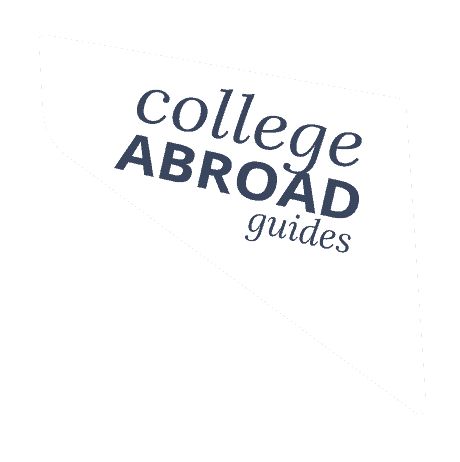Should I go to College Abroad?

- Originally published
- Last updated on November 14th, 2023 at 03:08 pm
Table of Contents
Should you go to college and get your entire degree abroad? After all, studying abroad for all four years of your degree isn’t just about sipping fancy coffee in a Parisian café or discovering hidden gems in bustling Asian markets (although those are definite perks!). It’s about embracing a once-in-a-lifetime opportunity to transform yourself, your worldview, and your horizons — and three to four years is a long time.
Of course, not everyone needs to be an international scholar. You need to grow, thrive, and learn no matter where you enroll!
Colleges and students alike want a “right fit” — a cultural match that contributes to the university’s vibrant academic life and the student’s plans.
So how do you know if you’re even a “right-fit” for a degree abroad?
Well, maybe you already fit one of these personas with traits that make you particularly likely to be drawn to the study abroad experience — and to have a great time as American students who study overseas.
From the language enthusiasts who salivate over foreign syllables to the global-minded go-getters ready to conquer the world, let’s dive into the world of personality avatars that are tailor-made for a thrilling, degree-packed adventure in a faraway land. So, buckle up, and let’s see if you’re one of the “types” that’s a prime candidate to say “Bon voyage!” 🌍✈️
Who Attends College Abroad? And What do the Happiest International Students Look Like?
International students who embrace their degrees abroad and make the most of the experience come from all academic fields and all corners of the globe. But they tend to look like these four main types.
1. The “Adventurous Explorers” Love New Places and New Perspectives

The Adventurous Explorer is the true embodiment of wanderlust, eager to soak in every moment of their study abroad journey, embracing the world as their classroom. No matter where they come from, they embrace their host country. With a backpack full of enthusiasm and a heart open to cultural encounters, they’re all set to seize the thrill of studying in foreign lands. What are they like at home? These characteristics may seem familiar:
- Traits:
- Curiosity Unleashed: They possess an insatiable thirst for exploring the unknown, and they’re eager to try out new sports, games, and experiences.
- Fearless Spirit: Adventurous Explorers don’t look before they step out of their comfort zones, making them fearless pioneers of their destinies. They’re equally eager to embrace a new board game and learn to drop into a skate bowl or repel off a climbing wall. Adventurous explorers will mingle at parties where they know no one, embrace various musical genres, and generally sample all life offers. Fearless spirits can be introverts, too. You’ll know them by their broad reading interests, diverse Netflix lists, and openness to trying new experiences, like a new restaurant or unfamiliar food.
- Adaptability Champions: They thrive in dynamic environments and quickly adapt to diverse situations. They’re at home working on group projects, taking exams, leading discussions, or learning from lectures. Plans change? They can roll with it.
- Activities:
- Off-the-Beaten-Path Exploration: From hiking scenic mountains to wandering through quaint alleys, they prefer exploring hidden gems and lesser-known spots. They might be interested in adventure and outdoor activities, from skiing to kayaking.
- Trip Planning: This personality type might take the initiative to organize group trips or expeditions during school breaks, encouraging classmates to explore new destinations together.
- Documenting Adventures: The Adventurous Explorer may be fond of documenting their adventures through photography, vlogging, or writing, sharing their experiences with friends and family.
- Interests:
- Adventure Sports Enthusiasts: Skydiving, surfing, or trekking – you name it, they’re up for any adrenaline-pumping escapade!
- Exploring National Parks: Adventurers are keen on visiting and exploring various national parks, observing diverse wildlife and stunning landscapes.
- Traveling to Remote Destinations: These aren’t bucket-list travelers. They seek out remote and off-the-beaten-path destinations, where they can immerse themselves in unique cultures and pristine environments.
Study Abroad Program Benefits for Adventurous Explorers
For the Adventurous Explorer, studying abroad isn’t just about obtaining a degree; it’s an exhilarating journey of self-discovery, global connections, and enriching experiences. By embracing this unique opportunity, they’ll shape themselves into well-rounded citizens of the world, armed with a degree and a heart full of memories that will inspire them for years to come.
Specifically, the adventurous explorer will benefit most in the following areas:
Adapting to Change: Thriving in dynamic environments, the Adventurous Explorer hones their adaptability skills by navigating various academic and social challenges while abroad. This ability to embrace change and uncertainty equips them with invaluable life skills, making them resilient and resourceful individuals.
Adventure and Travel Opportunities: Of course, one of the most obvious perks for the Adventurous Explorer is the abundance of travel opportunities! Studying abroad grants them easy access to explore neighboring countries, landmarks, and iconic destinations. Every weekend becomes a potential adventure waiting to unfold.
2. The “Language Enthusiasts” Want to Learn Another Language

For the Language Enthusiast, studying abroad is the ultimate opportunity to dive into the heart of another tongue, exploring its nuances, idioms, and cultural context. With a keen ear and a voracious appetite for linguistic discovery, they are poised to make the most of their international academic journey. Here’s what they look like in their home environments:
- Traits:
- Passionate Linguists: Language Enthusiasts have an inherent passion for languages and find joy in learning new tongues. They like downloading songs in the languages they’re learning, watching films with foreign subtitles, and reading children’s books or even cereal boxes while visiting other countries. They’re likely to pick up a few sentences the rest of the family does not while on holiday for just a few weeks.
- Patient and Persistent: They exhibit patience and persistence in honing their language skills, understanding that language acquisition takes time and practice.
- Cultural Curiosity: Language Enthusiasts are naturally curious about different cultures and view language as a gateway to understanding the essence of a society.
- Activities:
- Attending Language Clubs and Events: Language Enthusiasts participate in language clubs, workshops, and cultural events to deepen their linguistic knowledge and cultural understanding.
- Word Wizards: They’ll play with words even if they never make foreign languages their lifelong career path. These wordsmiths like to play with communication, embracing puns, crossword puzzles, and wordplay. They may participate in spelling bees or language proficiency tests to challenge themselves and showcase their language abilities.
- Attending Foreign Language Films or Events: They might attend foreign language film screenings, cultural events, or performances to further immerse themselves in language and culture.
- Interests:
- Learning Multiple Languages: They love challenging themselves by studying multiple languages simultaneously or sequentially, broadening their linguistic repertoire. Sign language? You betcha! The Greek alphabet song? Sounds fun! Learning ancient languages? Oooooh, fun.
- Engaging in Code-Switching: Language enthusiasts may engage in code-switching, using multiple languages in conversation, showcasing their linguistic skills. They may make up codes for their friends to use, or even invent their own language.
- Foreign Language Scrabble: They might play foreign language Scrabble or word games to challenge their language knowledge while having fun.
- Writing and Creating in Multiple Languages: Language enthusiasts enjoy writing, creating art, or composing music in multiple languages to express themselves creatively.
Study Abroad Benefits for Language Enthusiasts
For Language Enthusiasts, immersion is key. They don’t want to be part of a small study abroad cohort of language learners. These students prefer to be immersed in a culture and becoming more adept at the local language for the long term. They benefit from getting a degree abroad most in these areas:
Language Proficiency: (Duh). Nothing excites the Language Enthusiast more than the challenge of mastering a new language. Studying abroad provides the perfect environment to sharpen language skills through daily interactions and language courses. Fluency in a foreign language enhances their personal growth and boosts their employability in an increasingly interconnected world.
Diverse Language Exposure: Studying abroad exposes Language Enthusiasts to a diverse linguistic landscape. They can interact with speakers of different regional dialects and languages, broadening their linguistic repertoire and enriching their language-learning experience.
Academic and Career Opportunities: Proficiency in multiple languages opens doors to unique academic and career opportunities. Language Enthusiasts can pursue international studies, translation, interpretation, diplomatic roles, or work for global companies that value multilingual skills.
3. The “Global-Minded Future Professionals” Value International Experience

For Global-Minded Future Professionals, studying abroad is a strategic stepping stone toward realizing their ambitious global career goals. They may be business students. They may throw terms like “LATAM” and “EMEA” around with ease. With a determination to make an impact on the world stage, they are poised to leverage their international education and experiences for a successful and rewarding professional journey.
Here’s what they look like in their home environments:
- Traits:
- Ambitious Visionaries: They are ambitious individuals with a clear vision of their global career goals and aspirations. From the lemonade stand to the summer business in power-washing, these entrepreneurs are about their vision for the future and how they see themselves leaving a legacy.
- Open-Mindedness: Global-Minded Future Professionals have an open mind, embracing diverse perspectives and cultural differences. They like working across differences because it gives them ideas they never had before.
- Strong Networking Skills: They excel in building international networks, recognizing the value of global connections in their future endeavors. This type is even less likely to be introverted than the adventurers. They’re good at building bridges. They hold roles in student government, volunteer organizations, and other areas that let them flex leadership skills and feel they’ve gotten something done at the end of a hard day.
- Activities:
- Participation in International Events: Model U.N.? Oh, yes! They actively participate in international events, seminars, and conferences to expand their knowledge and network. That includes volunteering, so globally-minded future professionals may be found doing summer programs through churches and organizations like Amnesty International that help them participate in international issues and humanitarianism.
- Internships and Exchanges: Global-Minded Future Professionals seek international internships or exchange programs to gain real-world experience in different cultural settings.
- Open-minded debaters: While it may seem contradictory, the globally-minded pros spend their high school years exploring world issues. They join clubs like debate and student government and become good arguers when issues engage their passions. But they’re also known for being open to new people, places, and experiences, and can be charismatic, culturally-aware leaders.
- Interests:
- International Business and Trade: They are keenly interested in global business, international trade, and understanding how economies interact globally. As high schoolers, that may play out as an interest in industries or events that impact global business, like the cargo ship lodged in the Suez Canal, or the politics of oil-producing countries. They may get involved in watching plane radar apps or shipping routes. They are likely to keep up with global politics and news.
- International Relations Simulation Games: They might play simulation games that involve international relations, history, culture-building, global negotiations, and diplomacy.
- Global Fusions in Cuisine: They might experiment with fusion cuisines, incorporating international flavors and dishes into the party menu.
For the Global-Minded Future Professionals, studying abroad is a strategic stepping stone toward realizing their ambitious global career goals. With a determination to make an impact on the world stage, they are poised to leverage their international education and experiences for a successful and rewarding professional journey.
Want to Study Abroad as a Global-Minded Future Leader? Here’s How You’ll Benefit
These natural networkers will surely make some global networking connections abroad, but they’ll also benefit in other ways. They’ll gain:
Personal Growth and Independence: Living abroad encourages personal growth and independence. Global-Minded Future Professionals learn to navigate challenging situations, make decisions autonomously, and develop a heightened sense of self-reliance.
Internship and Job Opportunities: Many universities abroad facilitate internships and job placements, allowing Global-Minded Future Professionals to gain practical experience in international settings. This hands-on exposure strengthens their resumes and opens doors to exciting career opportunities.
Cultural Fluency and Adaptability: Immersing themselves in a foreign country enhances their cross-cultural communication skills and adaptability. These qualities are highly sought after by employers in today’s globalized job market, making them more competitive candidates for international positions.
4. The “Culturally Focused Scholars” Want to Immerse Themselves in Another Country

For the Culturally-Focused Scholars, studying abroad presents an unparalleled opportunity to immerse themselves in the cultures they study from music to art. With a passion for cultural understanding, they are poised to make the most of their international academic journey.
- Traits:
- Intellectual Curiosity: Culturally Focused Academics are deeply curious about different cultures, histories, and traditions. They hang out in social clubs, from student exchange to student government. They like places where they can plan holiday events, transitions like graduation, and life milestones. They like learning how others handle these events.
- Appreciation for Diversity: They value cultural diversity and see it as an opportunity for learning and personal growth.
- Respectful and Empathetic: Culturally Focused Academics approach their studies with respect for different cultures and empathize with the experiences of people from diverse backgrounds.
- Activities:
- Researching Cultural Topics: They engage in research projects on cultural studies, anthropology, folklore, and related fields. They’re likely to explore hobbies and clubs in areas like Irish dance, calligraphy, batik, etc.
- Participating in Cultural Events: Culturally Focused Academics actively participate in cultural events, festivals, and exhibitions to enrich their understanding of various cultures.
- Reading Literature from Different Cultures: They enjoy reading literature, folklore, and myths from different cultures, deepening their understanding of various societies and traditions. These are the friends who can tell you the difference between two disparate mythological figures from different cultures.
- Interests:
- Anthropology and Sociology: They are interested in studying human societies, cultures, and social structures, often choosing fields like anthropology and sociology.
- Learning Folklore and Traditions: Culturally Focused Academics delve into folklore, myths, and traditions of different cultures, fascinated by the stories and beliefs that shape societies. They can become keen historians or curators.
Culturally-Focused Scholars Can Gain a New Perspective and Meet New People from Different Countries
For the “Culturally Focused Academics” personality type, pursuing a degree abroad offers many benefits that perfectly align with their passion for cultural exploration and intellectual curiosity. Here are the compelling advantages of studying abroad for these culture enthusiasts:
Direct Cultural Immersion: Studying abroad provides Culturally Focused Academics with the opportunity to immerse themselves directly in the cultures they study. Living in a foreign country allows them to experience traditions, customs, and daily life, fostering a deeper understanding and appreciation for cultural diversity.
Access to Cultural Experts: Many universities abroad boast renowned faculty members and experts in cultural studies, anthropology, and related fields. Culturally Focused Academics can learn from and collaborate with these specialists, enriching their academic experience.
Building Resilient Memories: Studying abroad creates lasting memories and unforgettable experiences. From cultural festivals to breathtaking landscapes, the Adventurous Explorer gathers stories they’ll cherish and share forever.
Study Abroad for all Four Years? These Types aren’t the Whole Story
Recognizing these shared traits allows readers to appreciate the common ground among these personalities, irrespective of their individual paths. They inspire us to embrace our own passions, explore the world with an open heart, and develop a global mindset that fosters understanding and unity.
Is that you?
It can be hard to see these traits in yourself before embarking on a 4-year adventure. If they’re traits you’re looking to develop, not traits you already ooze, consider dipping your toes in the water with a summer program abroad during high school, or even a travel experience.
A little confidence goes a long way. You want to be knocked a little out of your comfort zone in college, but not so much that you can’t focus, don’t explore, retreat from making friends, and are miserable! (And here’s a hint: if you’re hesitant but want the benefits that studying abroad brings, choose a country, school, and buddy system that are more supportive so that when you’re having a hard time, you’ll be better off to recover well and make the most out of your experience).
So while these traits are somewhat self-fulfilling, realize there’s an easy answer to “Should I go to college abroad?”
Students who want to develop their adaptability and can view new cultures and places with an open mind are great candidates for studying abroad. Some schools even have international outreach or web pages dedicated to issues specific to American students looking to study abroad. The bigger questions are “where?” and “how?” Look into the benefits of studying abroad in Europe and check out countries like Ireland where you’ll find extensive student support systems from academic to mental health and social supports.
Related Posts

Jessica Share
Jessica is the writer, Ph.D., and mom-of-an-abroad-student-in-the-UK at the helm of College Abroad Guides. When she's not asking college students where the coolest place to hang out in their city is, she's figuring out how she can make $60 imported Greek oregano potato chips and £50 British bacon potato chips appear on her doorstep for the cost of a local bag of Lay's.





